Does Women’s Rise trigger Backlash?
The 2024 US election crystallised a stark gender divide, with Harris and Swift as feminist standard-bearers for the Democrats, while Trump and Musk rallied working-class male support for the Republicans, decrying ‘childless cat ladies’. But what drives this patriarchal backlash? Is it an inevitable function of women’s economic rise, or was it deliberately manufactured for political gain?
A fascinating new paper by Paula Rettl and colleagues suggests that women’s economic rise need not trigger political resistance. For the past 24 hours, I have done literally nothing but ponder the evidence and alternative interpretations. Buckle up.
The Global Evidence
In the US, when local industries feminised and blue-collar men lost relative economic status, they became more likely to endorse conservatism. As the gender gap in workforce participation closed, more people voted Republican (Clark et al 2023).
This pattern extends beyond American borders. In Brazil, regions where unemployment disproportionately affected men showed stronger support for Bolsonaro (Barros and Silva 2023). Meanwhile, British research indicates that people born in high-unemployment areas increasingly favour the male breadwinner (McNeil et al 2023).
Is the world zero sum? Does women’s economic rise inevitably spark gender antagonism? Recent evidence from Switzerland may rock your priors!
Paula Rettl, Diane Bolet, Catherine E. De Vries, Simone Cremaschi, Tarik Abou-Chadi, and Sergi Pardos-Prado reveal that while Swiss women’s economic gains affected men’s earnings and personal attitudes, these changes did not translate into political resistance. However, my own reading of the data is a little different.
Let’s dig in!
Switzerland’s Economic Transformation
Over the past 50 years, Swiss women’s workforce participation surged from 43% to 63%, while men's declined from 86% to 74%.
This shift varied across industries: education and public administration saw female employment rise by 38-40%, with substantial increases in real estate, professional services, and healthcare. Meanwhile, traditionally male sectors like transport and hospitality experienced declining female representation.
Labour market feminisation also varied across Switzerland. The map below shows clusters of high feminisation (darker blue) in areas where education and public administration jobs were historically concentrated, while areas dominated by manufacturing or hospitality show lower or even negative feminisation (lighter blues and reds).
This subnational variation plausibly reflects prior industry clusters. Harnessing this quasi-natural experiment, Rettl and colleagues compare outcomes across municipalities that were more or less exposed to feminisation. What do they find…?
Economic Impacts
When industries feminised, a small minority of men were displaced:
Male employment probability drops 2-4 percentage points
Annual income falls CHF 1,858-2,650 (2-4%)
Male share of household income declines 2-3%
Female income rises by CHF 2,500-5,000 (4-8%)
Gender Attitudes
The economic shifts triggered changes in men’s personal attitudes. Men affected by industry feminisation showed increased skepticism about gender equality in their personal relationships and reported feeling personally disadvantaged compared to women.
Who Feels Slighted?
These reactions were strongest among unemployed men, those with partners, and those with less education - suggesting that threats to breadwinner status, not just individual competition, drove these responses.
So it’s not just incels! That actually rocked my priors. Men with partners also express more resistance to gender equality in personal relationships - if affected by industry feminisation.
Looking at their descriptive statistics, my next concern is that the effect sizes are relatively small. A one standard deviation in industry feminisation increases men’s feelings of being personally penalised by 3.6-4.7% of a standard deviation. This is quite mild. Further, some results seem particularly sensitive to whether they include the 40% of Swiss who have moved. In fact, looking at the aggregate data over the time period, all gender ideologies are perfectly stable.
Since women did not pose an economic threat, far-right politicians have instead galvanised society-wide opposition to immigration.
The Political Puzzle
Despite personal grievances, Rettl and co-authors find no effect on far-right voting or support for conservative gender policies. Weird?
To explore what’s going on, they analyse 65 Swiss party manifestos, spanning 1999-2019. Using computational text analysis, they compare the frequency of economic terms to gender-related terms (like ‘women’, ‘pay equality’, ‘feminism’).
Unlike the the US, Swiss political parties never made gender salient. It received minimal attention.
So even though women’s economic advancement did displace some men, and triggered some private hostility, it was never actually catapulted into social antagonism. This is primarily because it was never leveraged by political entrepreneurs!
What Explains Swiss Exceptionalism?
Rettl and colleagues interpret their data as showing that the battle of the sexes is not inevitable - it is manufactured. While labor market changes can create personal resentment, this only becomes politically potent when actively mobilised. Trump’s “Make America Great Again” explicitly tapped into patriarchal nostalgia. Swiss parties, by contrast, never transformed patriarchal anxieties into political antagonism.
But let me share two alternative hypotheses - drawing on my own interviews across ten Swiss cantons, as well as the wider empirical literature:
Swiss women are mostly part-time
Premature data
Even though industries feminised, women were mostly working part-time, so this minimised the economic status threat. Moreover, if we extend the analysis to 2024, we see that there has been feminist mobilisation. Further data is needed to see whether this cultural shift has triggered patriarchal backlash.
Swiss women are mostly part-time
The majority (58%) of employed Swiss women work part-time, compared to just 22% in the US. Since most Swiss women work part-time, they are also much less likely to make it to management. The US, by contrast, is approaching parity in management.
This is consistent with Rettl and colleagues finding that industry feminisation only reduced male share of household income by 2-3%. ‘tis but a scratch! Why fret over a bevy of subordinates? Compared to the US, Swiss men’s patriarchal anxieties may have been far weaker.
Moreover, a large part of aggregate rising female labour force participation came from women aged over 55. Older women entering the labour market, earning relatively little, scarcely challenges men’s status.
Premature data
Since 2019 (their cut off), Switzerland has seen unprecedented mobilisation on gender! In June 2019, half a million women protested the gender pay gap, workplace discrimination, and unequal distribution of care work. In 2023, 300’000 women marched again! In 2024, there was another, nationwide feminist strike! Down the streets of Basel, women chorused:
“Unser Körper, unsere Strasse, unsere Welt” (Our body, our street, our world).
Sexuality has also been politicised. In 2020, voters approved extending anti-discrimination laws to protect sexual orientation, followed by the 2021 ‘Marriage for All’ referendum which legalised same-sex marriage and adoption. While both passed with strong majorities (63.1% and 64.1% respectively), they sparked intense public debates about gender. In 2020, paternity leave was finally introduced through referendum. The 2023 pension reform highlighted stark economic gender inequalities - the proposal to raise women’s retirement age proved deeply divisive, with opponents arguing it ignored persistent wage gaps and women’s disproportionate unpaid care work.
Curiously, the paper does not mention the past four years of massive gender antagonism.

Cultural Leapfrogging
Just as East Asian countries adopted technologies from the frontier and leapfrogged up the value chain, heightened connectivity enables the world’s women watch media from the ‘culturally egalitarian frontier’, and rapidly become more gender equal. They come to expect and demand better. One of the most popular films on Swiss Netflix right now is ‘GTmax’ - about a female motocross champion saving the day. Another is “The Hunt” - featuring an armed female heroine.
Does women’s rise threaten men’s status and trigger backlash?
Rettl and colleagues attribute the historical absence of gender antagonism in Switzerland to political restraint - arguing that while labor market changes created personal resentment, this only became politically potent when actively mobilised by politicians. Unlike Trump’s appeals to patriarchal nostalgia, Swiss parties never transformed these anxieties into political antagonism.
However, this interpretation warrants two important caveats. First, the apparent absence of political backlash may reflect the nature of women's economic advancement rather than political restraint. Since most Swiss women worked part-time (58% compared to 22% in the US), they posed minimal threat to male economic status. This is evidenced by the modest 2-3% reduction in male share of household income - a tiny challenge to men’s breadwinner status.
Second, extending the analysis beyond their 2019 cutoff reveals unprecedented feminist mobilisation, with massive strikes in 2019, 2023, and 2024 demanding workplace equality and better distribution of care work. This raises a crucial question: as Swiss patriarchy is challenged, will this trigger backlash?
Rather than demonstrating Swiss immunity to gender antagonism, the data may just capture a delay. To fully understand whether women’s economic advancement inevitably triggers patriarchal backlash, future research might examine not just women’s industry share, but their rank, relative earnings, and the intensity of feminist resistance - as well as subsequent political responses
Bravo to Paula Rettl, Diane Bolet, Catherine E. De Vries, Simone Cremaschi, Tarik Abou-Chadi, and Sergi Pardos-Prado for opening up fascinating questions! This paper really made me think!







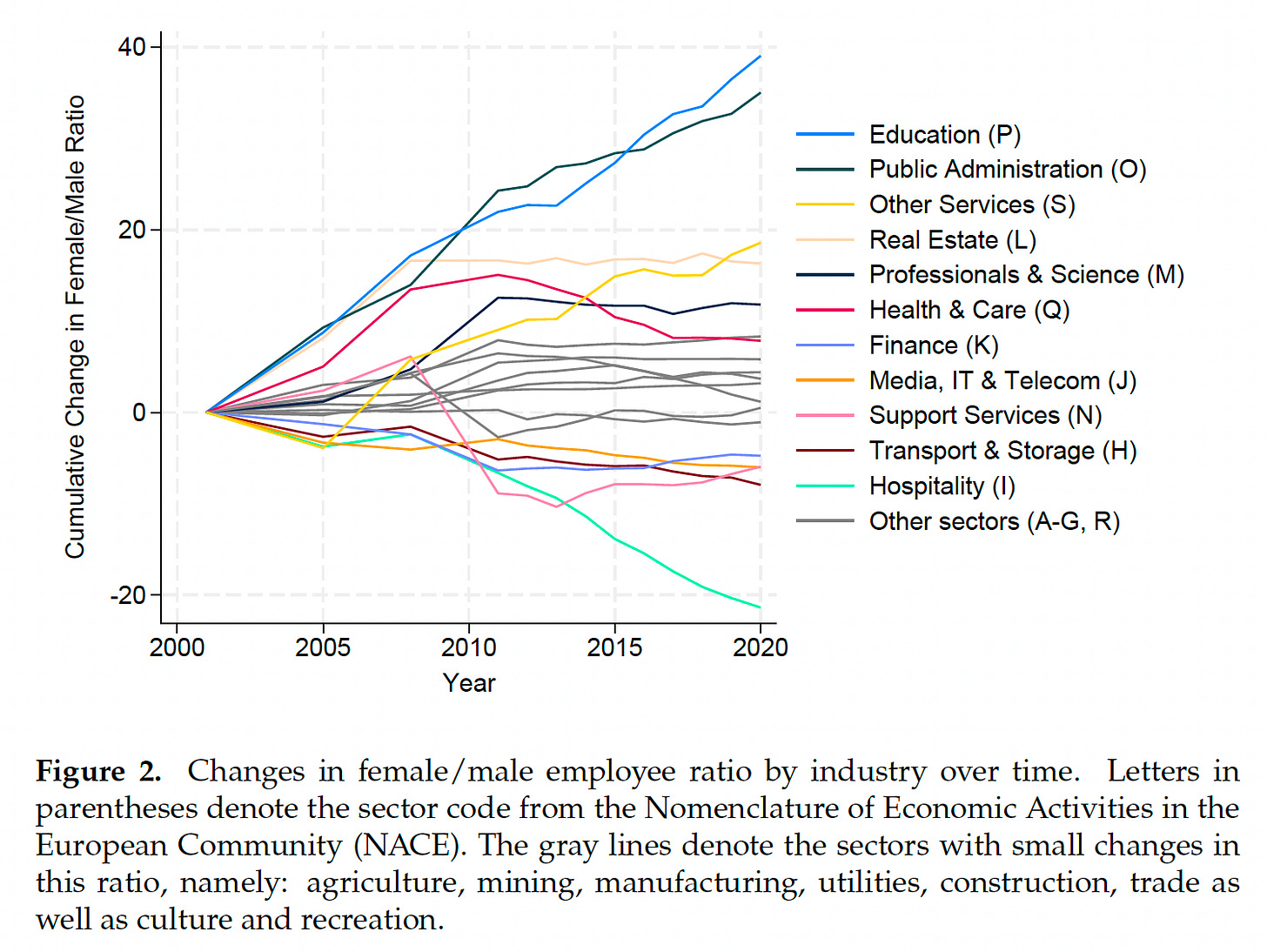
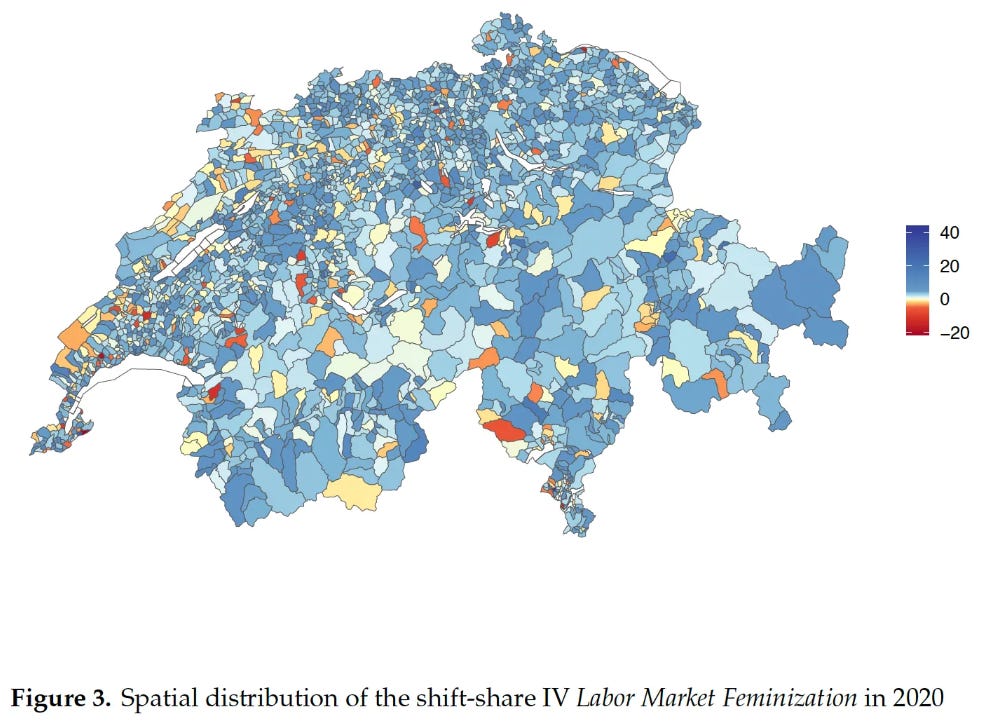





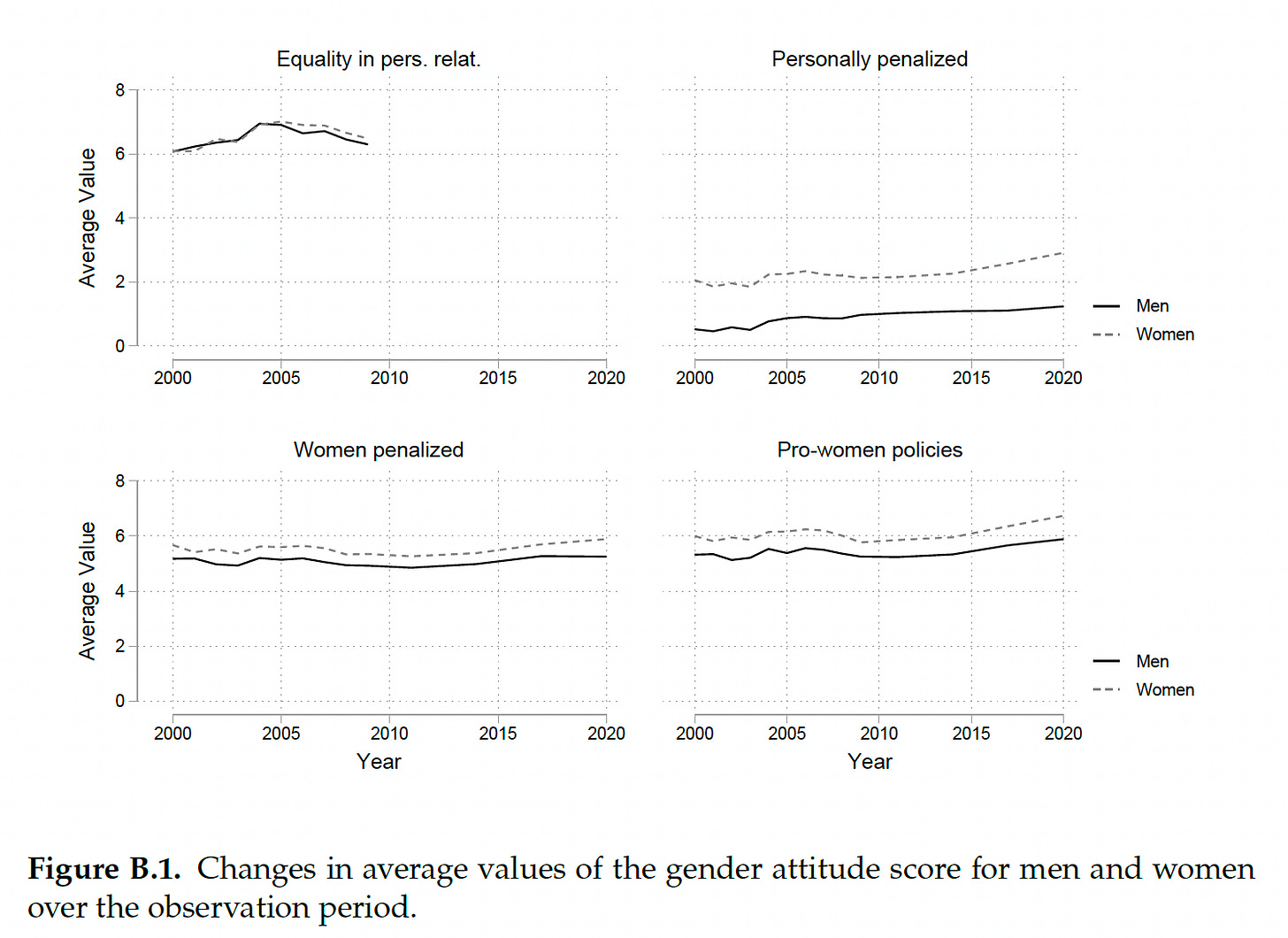



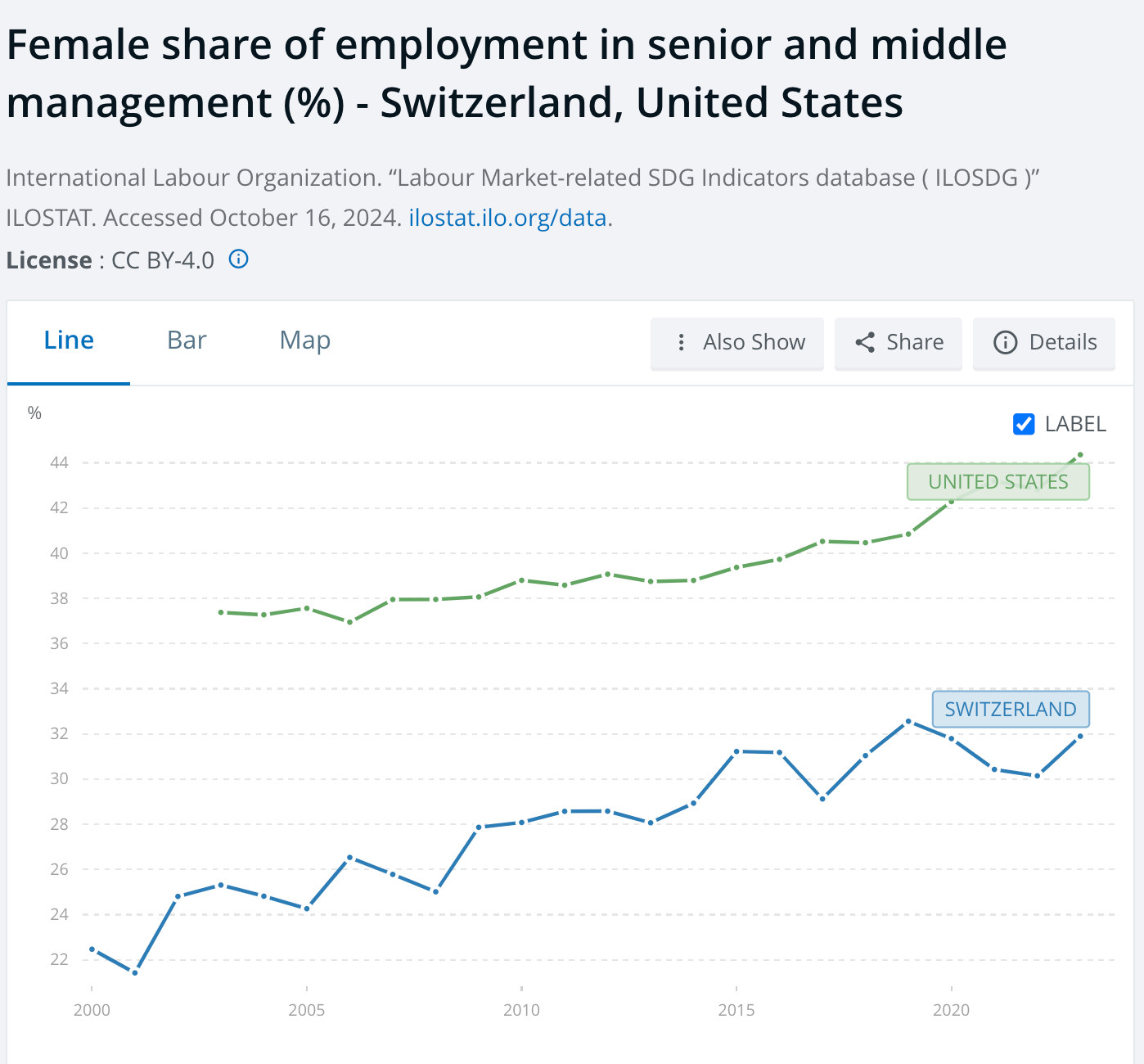
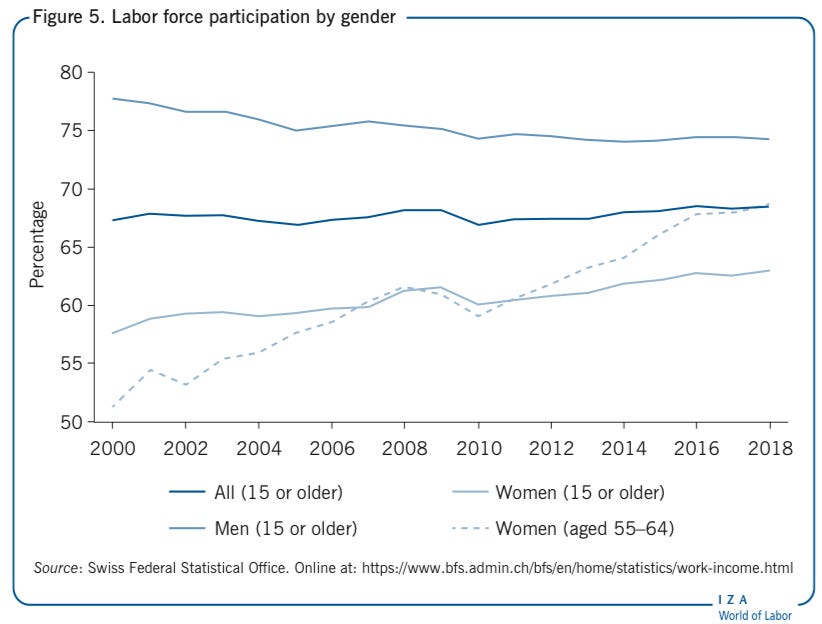

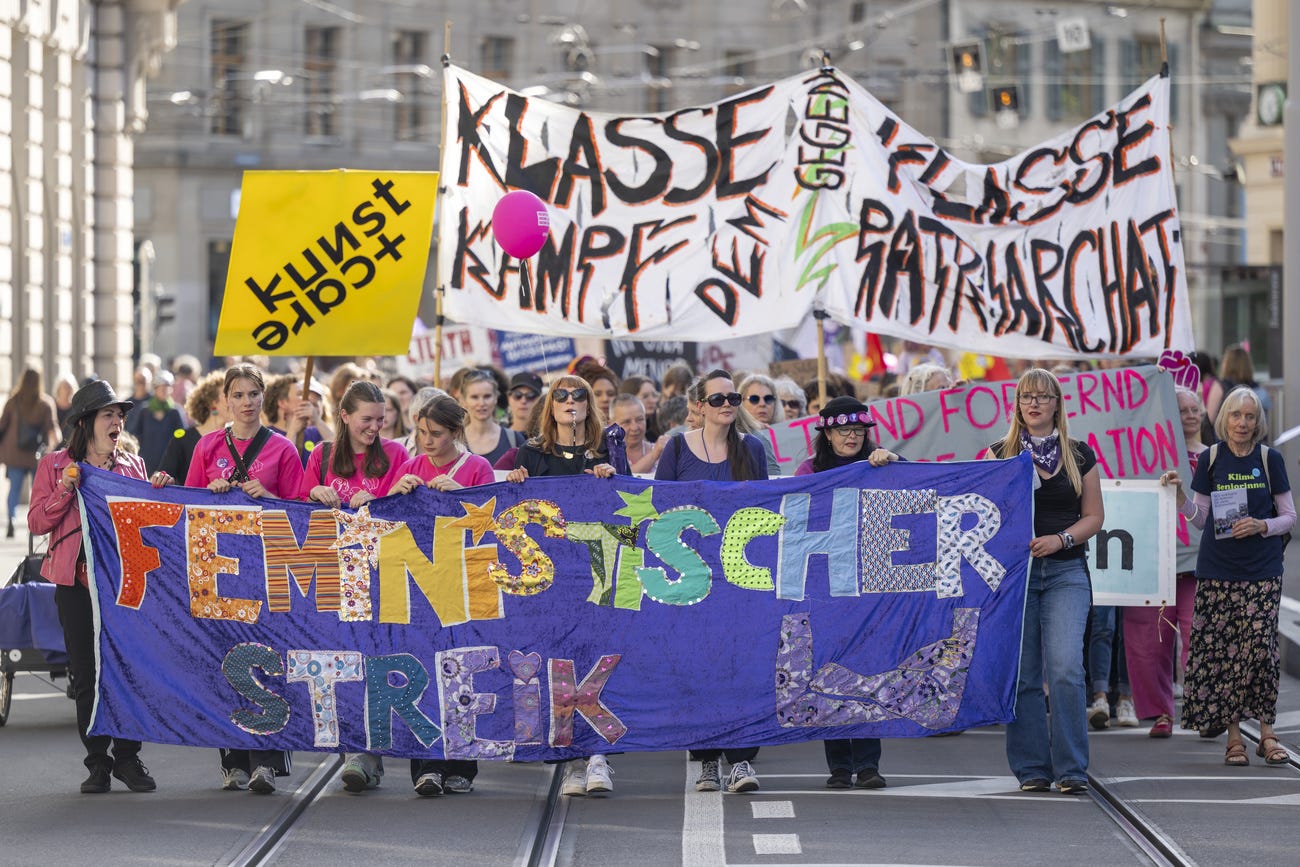


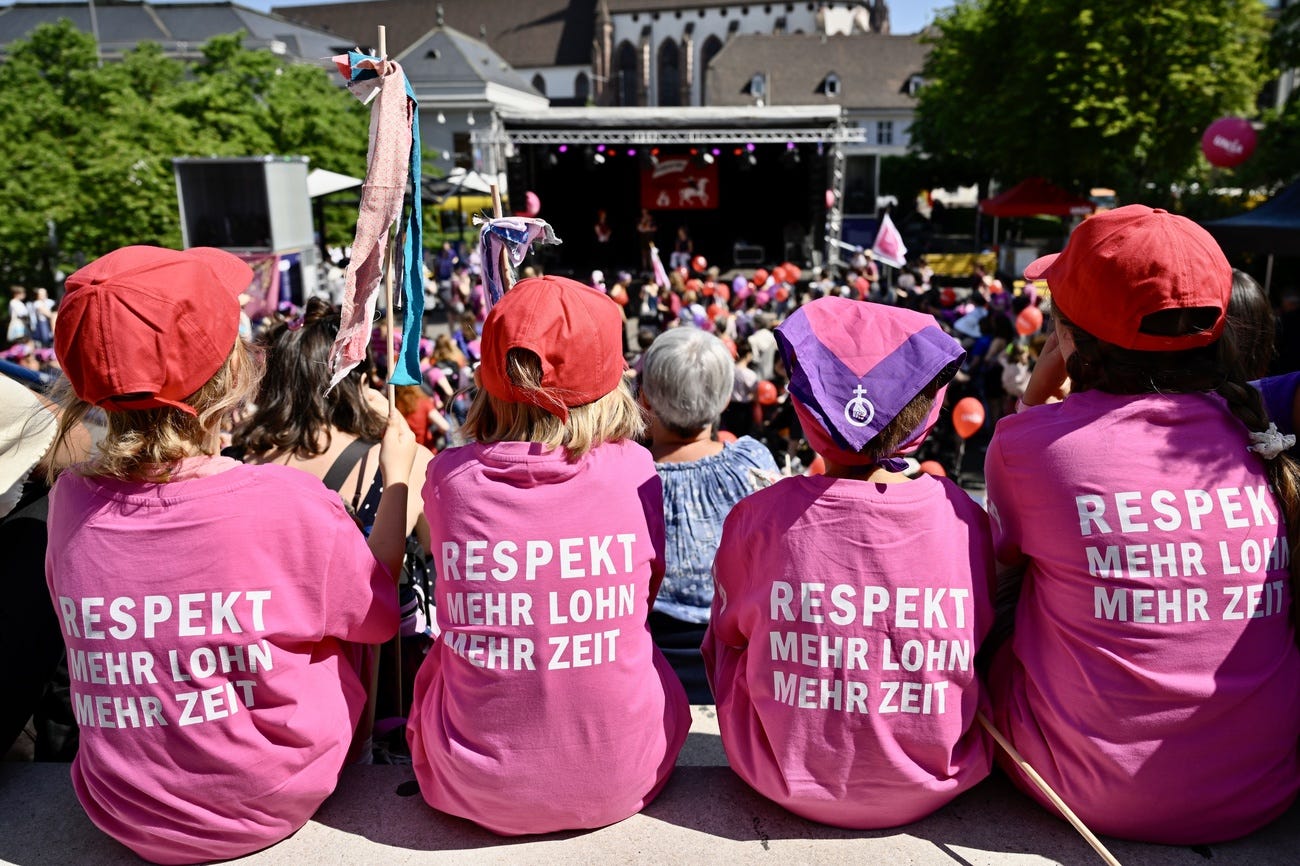
> Men affected by industry feminisation showed increased skepticism about gender equality in their personal relationships and reported feeling personally disadvantaged compared to women.
Have we considered whether these men have witnessed gender discrimination in their jobs? 3 out of the 4 companies I've worked at have practiced explicit gender discrimination. One allowed women multiple chances to pass skills-based interviews where men got just one. Another outright reserved headcount for women. Even more interesting is that women were already overrepresented relative to their representation in the field. We had 24% women software developers while women make up ~20% of software developers. But nevertheless we instituted the explicitly discriminatory policy of reserving headcount for women, in pursuit of our diversity target of 33% women software developers.
I've certainly become more skeptical of calls for "gender equality". Not because of opposition to equal treatment of men and women, but because much of the pursuit of "gender equality" I've witnessed has directly led to discrimination against one gender.
Has anyone looked empirically at the extent to which male backlash against feminism in different countries is influenced by whether or not the movement becomes saliently infected with misandry and support for anti-male discrimination? As an observer of the American culture wars, and a longtime denizen of their epicenter in academia, that seems like a key explanatory variable, here in the U.S. at least. For example, young men in the U.S. still poll strongly in favor of gender equality and women's rights, and they perform a more equal share of domestic work than their fathers, even as they have shifted their partisan allegiances sharply to the right over the past 5-10 years. This suggests that they have rejected the Democratic party and the woke left's approach to gender equality far more than they've rejected gender equality itself. In other words, is it possible that young American men don't reject feminism per se, they just reject the version of it that says they're inherently toxic and supports hiring discrimination against them in certain industries? Is it possible that right-wing parties in Switzerland didn't make gender salient because left-wing parties didn't make it salient first, like they did here? It may be a different story in more traditionally patriarchal countries like South Korea. You would know better than I. Anyway, curious to hear your thoughts on this.